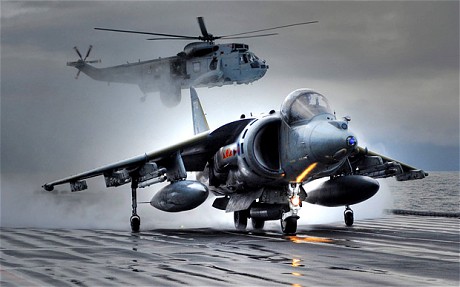
From Con Coughlin, the Telegraph: With every day that passes, the wanton destruction visited upon our Armed Forces by the Government’s inept handling of last year’s Strategic Defence and Security Review becomes more evident. The Royal Navy has insufficient ships to patrol the high seas; the Royal Air Force lacks the planes to defend the skies; while the Army, which was supposed to have escaped from the cuts relatively lightly, does not have the money to equip all its soldiers properly.
Worse, the relish with which the Coalition has set about cutting the defence budget has not been matched by its promise, enshrined by the National Security Council last year, to avoid unnecessary involvement in overseas conflicts. This was one of the main reasons, after all, that the Coalition agreed to increase the foreign aid budget by a whopping 50 per cent. If more money were spent on conflict prevention, the argument went, we would not need to keep deploying our Armed Forces to godforsaken parts of the world in costly and unpopular military escapades. But that was before the Coalition decided to indulge in yet another policy U-turn – and one entirely against the spirit of the new doctrine – by taking up arms against Colonel Gaddafi. . . .
Admiral Sir Mark Stanhope, the First Sea Lord, believes that the effectiveness of Britain’s contribution to the Nato mission has been limited by our inability to place an aircraft carrier off the Libyan coast. This is because, as part of the defence cuts, HMS Ark Royal, the Royal Navy’s flagship, was consigned to the scrapheap, together with its complement of Harrier jump jets. Ark Royal is currently for sale on the MoD’s equivalent of eBay – the latest suggestion is to turn it into a floating casino – while the Harriers, which underwent a multi-million pound refit just before they were unceremoniously withdrawn from service, have been flogged to the US Marines for a bargain-basement £34 million. What’s good for the Americans is clearly not good enough for Mr Cameron and his Cabinet chums. . . .
What those responsible for making these decisions fail to realise is that they have an immediate, and invariably negative, impact on the operational effectiveness of our Armed Forces. Instead of deploying an aircraft carrier in Libya, as the French have done, we have been reduced to cobbling together a makeshift substitute, comprising four Apache helicopters and an amphibious assault ship. Apart from making us a laughing stock in the eyes of our French and American allies, this arrangement is not actually working out. The Apaches are struggling to fulfil the type of combat roles that would have been undertaken by the Harriers: indeed, their susceptibility to ground attack means that in the two sorties they have flown since their deployment earlier this month, they have been required to fire from over the sea for fear of being shot down, which severely curtails their effectiveness. . . .
With key military capabilities being lost on an almost daily basis, it is easy to understand why Dr Paul Cornish, the head of the International Security Programme at the influential Chatham House think tank in London, has described last year’s SDSR as “one of the fastest failures in modern British strategic history”. (photo: EPA)
Image: epa%206%2015%2011%20Britain%20defense%20cuts.jpg
